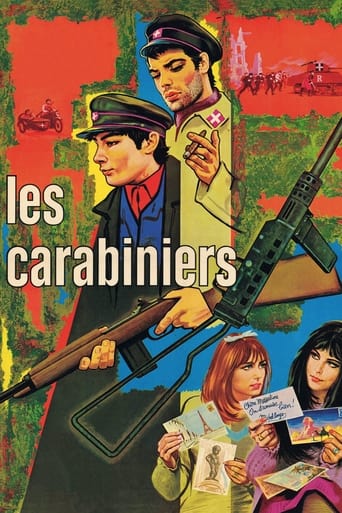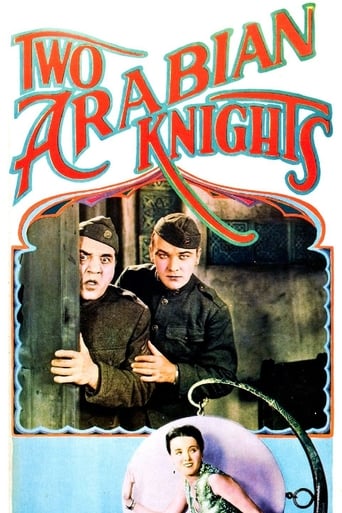


The Carabineers
During a war in an imaginary country, unscrupulous soldiers recruit poor farmers with promises of an easy and happy life. Two of these farmers write to their wives of their exploits.
-
- Cast:
- Marino Masé , Geneviève Galéa , Catherine Ribeiro , Barbet Schroeder , Jean-Louis Comolli , Jean Brassat , Odile Geoffroy


Reviews
good back-story, and good acting
It is not deep, but it is fun to watch. It does have a bit more of an edge to it than other similar films.
This movie was so-so. It had it's moments, but wasn't the greatest.
It is a whirlwind of delight --- attractive actors, stunning couture, spectacular sets and outrageous parties.
Jean Rouch has called this movie, the best anti war movie ever. He points out that the anti-epic character of the movie comes most close to the character of war, because war also works really anti-epic, too. So I really can't understand why the first comment to this movie on this page, which is really foolish and just shows that its writer has no idea of movies at all, isn't removed!!!!!!!! !!!!!!!!!!!!!!!!!!!!!!!!!! !!!!!!!!!!!!!!!! !!!!!!!!!!!!!!!!!!!!!!!!!!!!! !!!!!!!!!!!!!!!!!!!!!! !!!!!!!!!!!!!!!!! !!!!!!!!!!!!!!!!!!!!!!!!!! !!!!!!!!!!!!!!!! !!!!!!!!!!!!!!!!!!!!!!!!! !!!!!!!!!!!!!!!!!!!!!!!!!!!! !!!!!!!!!!!!!!!!!!!!!!!! !!!!!!!!!! !!!!!!!!!!!!!!!!!!!!!! It insults the work of a genius.
One of Godard's better films from the 60's, which like a number of his films from his prime era is usually either liked a lot or detested to hell, is almost audience-dividing on purpose. His film is a black comedy that sometimes is (successfully) deceptively a bleak drama of corruption of the working man in times of War. Stylistically it is Godard all the way, though one can't disregard the likely significant contributions (though it may be hard to detect since it IS Godard's mouth all over the pie so to speak) of screenwriters Jean Gurault (usually Truffaut's co-writer), and (apparently) Roberto Rossellini. Rossellini, who was one of Godard's big influences, is countered by what was also a big influence likely on this picture, Samuel Fuller, the king of B War pictures. So one could look at the quasi-split of ideals in the film, of Rossellini's documentary style of telling it like it is, crossed with Fuller's hard professionalism and no-holds- barred view of War. Whomever influence comes through stronger, this is really Godard's show, and has here something that is fairly usual in terms of his challenging styles and criticizing past films (including Truffaut with his own comments on War depicted in film), but also is unique for how it is presented, and makes it a difficult, though rewarding experience. This is the French new-wave equivalent, to put it another way, to Sam Mendes's Jarhead; you're not sure if this really should be classified as a typical 'war' film, despite being in a league of other films already in place.One thing that is as fascinating as it is occasionally frustrating is Godard's main male actors, Albert Muross and Marino Mase, are not very expressive, and of course are not really 'actors' in the traditional sense (at least at the time they were close to un- professionals). But maybe that is what's needed, dumb farm boys who are propogandized into going to fight for their invading, nameless country; the opening scenes of the list of things the men will get is equally funny and troubling. Then the boys go off to war, and there is a really astute episodic kind of storytelling used, which works considering the short time length. One scene that really stood out was when one of the soldiers goes to see his first film ever, and is almost like some kind of primate seeing a woman disrobing on a screen (it's also arguably the funniest scene in the film). When the boys come home they are loaded with pictures, in a scene that is the one that almost had me questioning if it was either really good or really too long; the length of the list of pictures is like a litmus test for moviegoers- can you take all of these images, done almost to make a point that's not too clear? But what makes Les Carabiniers work for me is how it is so un-like other war films that it stands alone on its own terms, like a French new-wave Dr. Strangelove (though maybe not a masterpiece like that one). At times I wasn't totally sure where the satire started or ended, and there is a certain distance that Godard places with his many long-shots getting in as much landscape as tanks and soldiers with their guns. What's surprising is how the tone is always assured, which is crucial considering this is a story told through the side of the invaders this time, men working under their elusive King for land and riches and wealth. One of the best scenes I may have seen in any Godard film is when they have a woman who is at first thought to be 'a friend' of the soldiers, but then goes off on a Leninist rant. The men are about to shoot her, but can't for a few minutes, as the words she says strike some kind of chord in their primal mindsets. Amid montages of archive footage of planes flying and bombs dropping, there's a scene that would never ever be in any 'conventional' war picture. There's a real thought process going on here, and even if it's got some of Godard's usual 'f*** you, it's my style, take it or leave it' attitude, it's not totally un-accessible either. It's a slim volume of gritty anti-War pathos, and it's maybe a tad under-rated in the director's massive catalog.
While this is certainly not Godard's most enjoyable work some of the negative comments here are world-class examples of point-missing.Godard had already shown with "A Bout de Soufflé" and "Vivre Sa Vie" that he knew how to make a film with style, romance and flair. Therefore it's clear that the crude editing and sound dubbing, continuity lapses, bad acting and overall cheapness on display here were deliberate.What we seem to have here is "War for Dummies". Godard spells things out as if talking to backward children and absolutely refuses to invest his subject and his protagonists with any sort of spectacle or dignity, both by giving us moronic and unsympathetic characters and by refusing the audience any catharsis or vicarious pleasure.Francois Truffaut once said that no war movie can be truly anti-war, since the camera automatically aestheticizes its subject. Godard here goes all-out to disprove that thesis.This does of course make the film hard to watch but it's a deliberate slap in the face, not the result of incompetence.Incidents from many wars are parodied - for example scenes of the women having their hair cut off refer to the treatment of French women who had consorted with Germans during the Occupation. "America" is represented by a car with tail fins and some French tower blocks, in a prefiguring of "Alphaville"s approach to location. Apparently the letters used as intertitles are genuine letters home from French troops in various conflicts, although this does not seem to be made clear in the film.I tend to agree that this is a film for Godard completists only and certainly not the best place to start with his work. The best comparison to make would be with Alfred Jarry's "Ubu Roi" which takes the same crude approach, and apparently the project started life as a stage play.See "Weekend" for a similar approach to 'peace', only with a lot more fun and games.
That this movie got a 6.8 on the IMDB rating scale astounds me. That its audiences were expected to pay to see it and that it was thought worthy of being re-issued on dvd astounds me. Whatever points it was trying to make got lost in the what I found to be the ugliness of the film-making. Jean-Luc Godard, je vous accuse.

